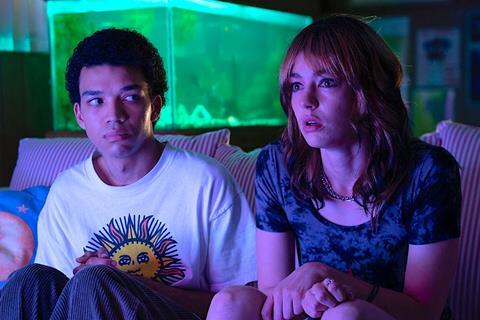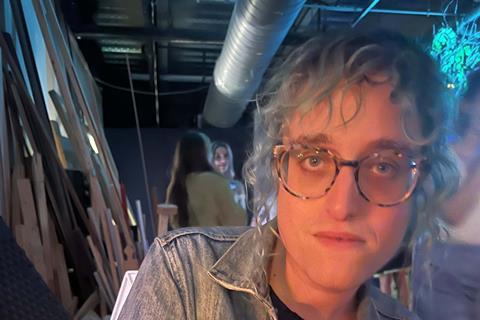
Jane Schoenbrun’s I Saw The TV Glow receives its international premiere in Panorama on February 20 following rave reviews in Sundance. Like the non-binary filmmaker’s previous feature We’re All Going To The World’s Fair, which debuted at the virtual Sundance 2021, their second feature is an intimate, unsettling exploration of adolescent identity, gender dysphoria and vulnerability.
Justice Smith and Brigette Lundy-Paine star as Owen and Maddy, teen loners who bond over a shared obsession with a supernatural TV show. The potency of the small screen is writ large on I Saw The TV Glow, as it is in Schoenbrun’s earlier work. In the filmmaker’s hands, The Pink Opaque — the fictitious TV show that enthrals the youngsters — offers escape into a psychologically exotic world. Reality becomes blurred with the show’s phantasmagorical realm, yet through it all Owen comes to understand his authentic self.
“This is a movie I wrote from within the early stages of gender transition, with a really earnest goal of trying to capture the complexity of how that moment felt,” says 37-year-old Schoenbrun, who transitioned in their early thirties. The Westchester, New York-born filmmaker, who divides their time between Hudson and Brooklyn, had written the script prior to the world premiere of We’re All Going To The World’s Fair, which centres on a neglected adolescent curious about their identity who becomes transfixed by an online horror game.
World’s Fair was made on a shoestring budget, which allowed Schoenbrun to retain artistic autonomy — as they did on their fruitful collaboration with A24 on I Saw The TV Glow. “I was making up my own episodes of the TV shows I watched as a kid. Because I grew up in such a media-saturated environment, where I found myself most was in television shows or strange stories on the internet, and later on in cinema.”
Fans and critics took notice of the World’s Fair and its finely wrought character study, drenched in what is becoming a signature neon and blacklight palette that seemed otherworldly yet relatable. The film sold to US theatrical distributor Utopia and what was then called HBO Max for streaming in the US.
Fevered interest

I Saw The TV Glow found early champions in Emma Stone and David McCary’s production company Fruit Tree. A24 came on board to back the film after “a lot of enthusiasm and a lot of offers” around Hollywood. Production took place in the summer of 2022 in suburban New Jersey.
A major influence was cult US TV series Buffy The Vampire Slayer, which ran from 1997-2003. “It was an obsession and a real balm for me in my adolescent years,” they reflect. “I rewatched my tapes over and over again, and like Owen and Maddy do with The Pink Opaque, I thought of the characters like family. Buffy will always be an influence on everything I create.”
Schoenbrun’s early-years creativity as “that 13-year-old kid with the camcorder” was challenged at Boston University film school and conventional tuition on writing and shooting a three-act screenplay. They lost confidence in their artistic direction. “I internalised, as I did many parts of my life, this idea of wrongness and how, when I tried to make things, they came out wrong,” they say.
A job at New York non-profit Independent Filmmaker Project from 2014-16, where they found and nurtured filmmakers, helped restore a belief in individuality, as did the films of dark masters David Lynch and David Cronenberg. Music was an escape in their youth, too, and Alex G’s bewitching score is accompanied by a lush soundtrack of Elliott Smith, Cocteau Twins (after whose compilation album The Pink Opaque gets its name) and The Smashing Pumpkins, whose 1995 double album Mellon Collie And The Infinite Sadness is a clear reference.
“When you realise you’re trans, which is a beautiful discovery, you’re also faced with the overwhelming terror of knowing your life is going to change in a pretty dramatic way,” they say. “This movie was an attempt to represent how overwhelming that realisation can be.”
Schoenbrun has just completed a draft on their first novel, which they describe as “my first true opus, expanding on the themes of the first two films but in more of a universe-building, epic kind of way”. They are also trying to get a third feature off the ground and hope to make it within the next year.
But first, Berlin. “For the amount that I love European and international film culture I don’t get enough opportunities to be a part of it, so I’m very excited about Berlin.”
























No comments yet